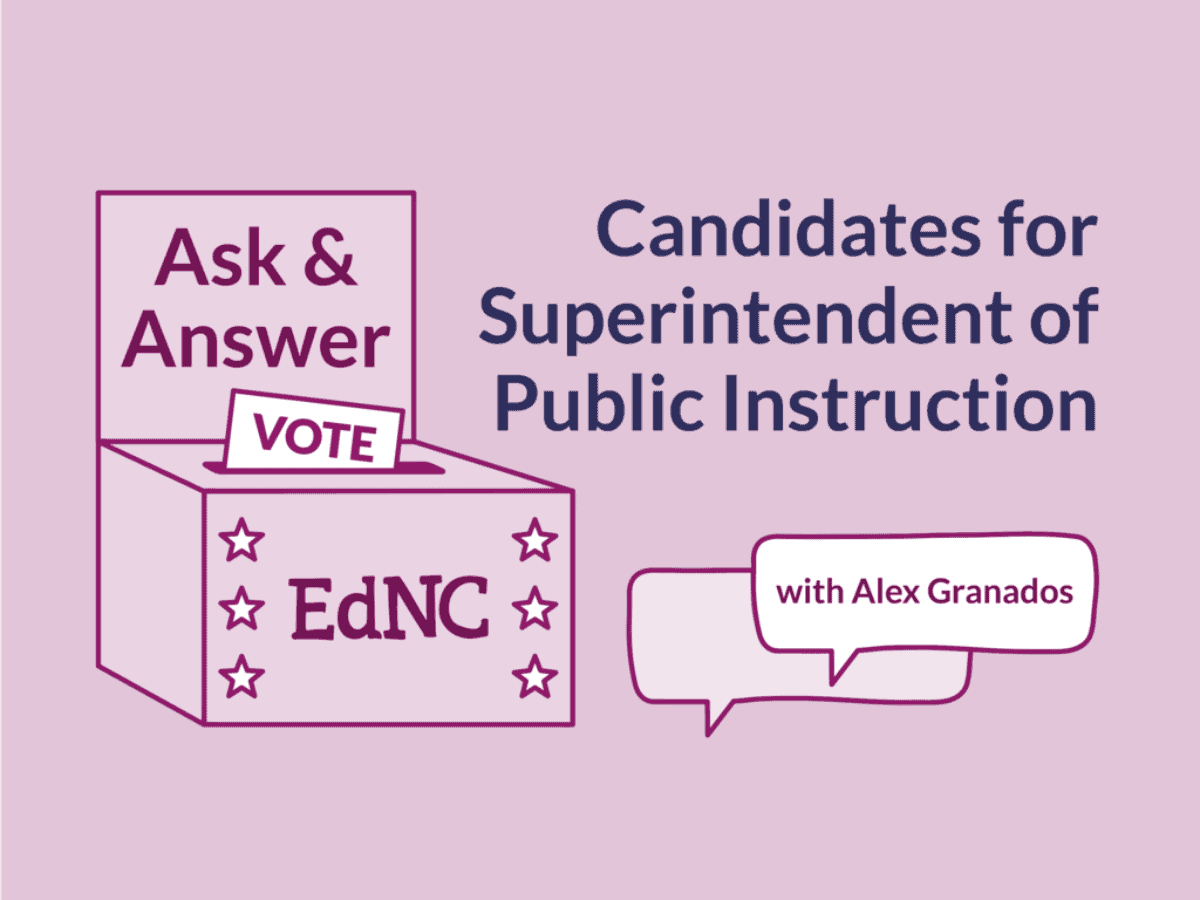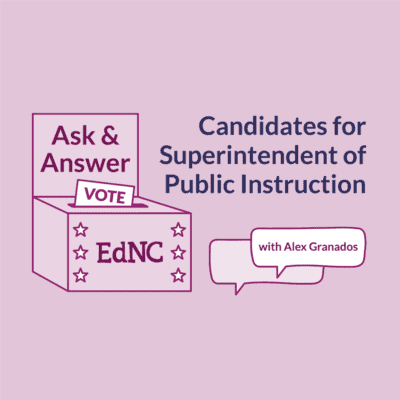
In a recent survey, EducationNC asked teachers what questions they had for the two candidates for state superintendent of public instruction. We winnowed the responses down to the best five and added three of our own. We are going to ask the two candidates for state superintendent one question a week and publish their responses.
Q: How will you work with the governor and the General Assembly?
Democratic candidate Jen Mangrum
How will I work with the governor and the General Assembly? This is a tricky question as these two branches are currently working to opposite ends. That situation might be different come January 2021.
Gov. Roy Cooper shares my goal of creating a well-resourced school system capable of allowing all children to succeed, regardless of their background. His budgets have consistently sought to create competitive pay for educators, provide supports for low-performing schools, deepen connections between K-12 and post-secondary opportunities, and increase staffing levels for support personnel such as nurses, counselors, psychologists, and social workers.
Gov. Cooper’s commitment to public schools is also reflected in the Leandro case’s fiscal year 2021 action plan that was provided to the courts last week. The plan marks an important first step towards remedying a decades-long injustice: North Carolina’s failure to provide a sound basic education to all students. The plan — a collaboration between the governor’s staff and the Leandro parties — establishes smart priorities which increase support for low-income, disabled, and English-learning students while moving our schools towards recommended staffing levels for school support personnel. Additionally, the plan would expand early learning opportunities, strengthen the recruitment and retention of educators and school leaders, improve ties to postsecondary opportunities, and overhaul a school accountability system that exacerbates school segregation.
The governor and I share a common vision for public education in North Carolina. He has told me on several occasions how important this role is and how we must win it back so that we can do great things for our students, families and school personnel. I look forward to joining him in that fight and collaborating on new ideas to advance educational equity and excellence.
The governor’s record on education stands in stark contrast to the General Assembly’s under the current leadership.
The General Assembly has prioritized tax cuts for corporations and wealthy North Carolinians instead of funding our schools. These tax cuts drained $3.6 billion from state coffers in the past year, starving our schools from the resources needed to help students succeed. As a result, school budgets remain below where they were before the Great Recession. As we enter a period of unprecedented student needs, our schools are making do with fewer teachers, fewer teacher assistants, fewer support personnel, no money for professional development, and pitifully insufficient funding for basic needs like textbooks and supplies. As of the 2016-17 school year (a budget year that happens to coincide with my opponent’s tenure as education adviser to one-term Gov. Pat McCrory), North Carolina ranks dead last in terms of school funding effort. No state in the country dedicates a smaller share of its economy towards its schools than North Carolina.
Rather than building upon success stories like More at Four, Learn and Earn, Teaching Fellows, and strong state support of struggling districts, General Assembly leaders have prioritized failed school choice schemes (hello unfettered charter growth and the nation’s least accountable voucher program), a debasement of the teaching profession (bye bye career status, master’s pay, and National Board application costs), and an accountability system that tells us more about the income levels of students’ families than it does about the quality of learning. As a result, student performance has plateaued and opportunity gaps have widened. As the WestEd report concluded, the past decade’s actions have left our state “further away from meeting its constitutional obligation to provide every child with the opportunity for a sound basic education than it was when the Supreme Court of North Carolina issued the Leandro decision more than 20 years ago.”
The state of affairs at the state Department of Public Instruction (DPI) is even more grim. For the past two years we’ve had a superintendent willing to work with the General Assembly as they’ve chopped the agency’s budget. As a result, the agency can no longer turn around low-performing schools and districts or provide basic financial oversight. DPI employees tell me that morale is at an all-time low.
So I’m not going to work with a General Assembly that’s going to continue moving our schools in the wrong direction. I’m not going to be part of efforts to defund and privatize education. I’m not going to foster an environment of mistrust and dysfunction within DPI.
That’s why my first step in “working with the General Assembly” is working to change the leadership of the General Assembly. I’m running for superintendent to be part of a pro-education wave of leaders who will sweep into office and restore North Carolina’s position as the premier education state in the South. I’m running to inspire voters to come out in November to support candidates who will put the needs of children above those of the donor class.
While I’m optimistic that this November will bring real change to Raleigh, I’m prepared to use every lever at my disposal to provide our children with the education they’re owed. I know most North Carolinians appreciate how we all benefit from a strong education system. That’s why I plan on engaging and organizing families and educators to fight for schools that will meet the needs of all of our students. We will educate and mobilize voters. If there are representatives and senators who are unwilling to meet their constitutional obligations to provide every child with a good education, we will replace them with lawmakers who will.
Of course, it remains important to find areas of common ground. I know many General Assembly members in the other party who are dissatisfied with the misguided course charted by Sen. Phil Berger and Rep. Tim Moore. They’re familiar with North Carolina’s history. They know our students experienced the greatest success when lawmakers from both parties worked to strengthen the teacher profession and provide all of our students with the resources necessary to succeed. They know that children from all backgrounds thrive in integrated schools.
So I will happily partner with lawmakers from either party who share my vision for well-resourced, integrated school communities that provide all children with equal opportunities to thrive. But if faced with a General Assembly intent on moving our state backwards, I will use every tool at my disposal to fight for our kids.
Republican candidate Catherine Truitt
Over the past decade, my resume has changed quite a bit as I’ve taken different opportunities to improve education outcomes for students and adults everywhere. But one phrase on my resume has remained: “consensus-builder”. Whether working on a team with my colleagues at West Johnston High School, coaching principals to try new approaches to discipline, or negotiating with the legislature to pass the largest single teacher pay raise in North Carolina history, I have always provided authentic leadership that is built on mutual respect for all and keeps students at the center of every decision we make.
The ability to engage others in a way that allows for collaboration and compromise while multiple voices are heard is at the heart of good leadership. Education in particular is about relationships with both young people and adults and requires a culture of trust and accountability. My work experience has taught me that honest conversations that center around data and our mission rather than partisan politics is key to facilitating change. We all hopefully want the same thing: better outcomes than we have now for ALL children in our state. The way we get there is where we may disagree.
During a candidate forum this winter, all seven state superintendent candidates were asked to grade North Carolina’s public schools. Our answers ranged from “A” to “C”. My opponent decided to add, “but I would give legislators an F.” This comment is insulting to legislators of both parties who take on an incredible amount of work on behalf of us all for a stipend of around $13,000 per year, and it damages her credibility with these folks. Regardless of whether one feels there is truth in her statement, this type of public admonishment is not appropriate, nor does it indicate an ability to work across the aisle and build trust.
When elected, I pledge to work with legislators from both sides of the aisle, and to work with the governor and his designees regardless of what political party they are from. And this work will be characterized by respect and the understanding that we must always ask the question, “is this what’s best for students?”
I am also confident legislators from either party, a governor from either party, and State Board of Education members from either party, will be willing to work with me because they know I respect them, I respect their opinions and perspective, that I will always be honest with them, and, unlike others, I have not and will not ever personally attack them or their character. We will agree at times and we will disagree at times but will seek consensus when possible. We will leave the room as friends who respect each other as fellow leaders who care deeply about North Carolina and who want what is best for ALL students.
Editor’s clarification: Catherine Truitt’s statement says “negotiating with the legislature to pass the largest single teacher pay raise in North Carolina history …” It was one of the largest teacher pay raise allocations in North Carolina history.


